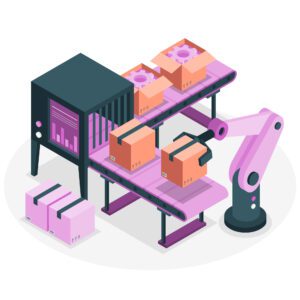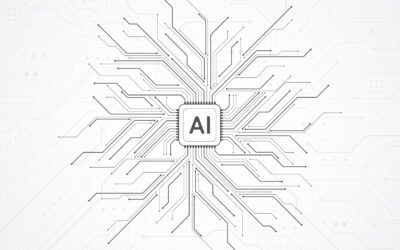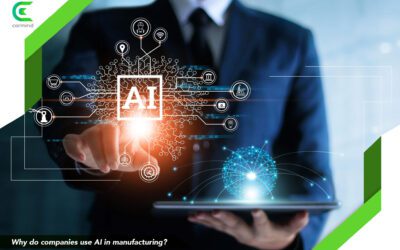Since the Industrial Revolution, the world of manufacturing has undergone numerous changes. But the transformation we are facing today is perhaps the most radical: autonomous factories powered by artificial intelligence. In this article, we will discuss the CorAI system, the latest point of artificial intelligence in the field of production, its advantages, and how it works.
What is Factory Intelligence?
Factory intelligence is an advanced digital systems that not only operate based on data but also understands context, analyzes past experiences and current data together, and guides production processes.
This approach has enabled machines to not only work but also learn, analyze the situation, and make the most appropriate decision. In this way, productivity has increased, error rates have decreased, and sustainability goals have been achieved faster. This structure, which goes beyond classical automation, has ushered in a new era where artificial intelligence technologies meet industrial production.
Transition from Automation to Intelligence
Classical automation systems execute tasks according to predefined rules. However, in today’s dynamic production environments, these fixed structures are often insufficient. Thanks to artificial intelligence, machines can analyze changing conditions and make flexible and situation-specific decisions. This transformation enables agility, adaptability, and high accuracy in production lines. Therefore, in addition to automating processes, the digitalization of decision-making processes becomes possible.
Autonomous Management with AI
Artificial intelligence-supported systems go beyond performing tasks, analyzing and learning processes, and offering suggestions for improvement. Accordingly, autonomous management enables the production line, planning stages, and maintenance processes to proceed without the need for external intervention. This reduces dependency on human intervention and increases the ability of production systems to make self-determination and operate sustainably.
What is CorAI and How Does It Work?
CorAI is an artificial intelligence engine developed by Cormind that enables production facilities to operate autonomously, utilizing a decision-making infrastructure based on artificial intelligence. It focuses on making the most accurate decisions in production processes by analyzing real-time data flow. Its large language model (LLM) based structure increases the learning capability of the system. Thus, it dynamically adapts to every production environment.
Cormind’s AI Engine
The powerful artificial intelligence engine at the heart of CorAI optimizes production decisions by processing millions of data points in seconds. This engine enables the system to generate intuitive responses. Moreover, not only production data but also environmental factors, operator habits, and past scenarios are integrated into the decision mechanism. This gives the system a holistic view.
LLM Based Decision Making
CorAI’s decision-making infrastructure is based on large language models. In this way, the system not only processes data but also establishes cause-and-effect relationships, extracts meaning, and provides recommendations. This allows the system to provide more natural and human-like responses. The system can also understand natural language commands from users and produce outputs that are appropriate for the production system.
Sensor Data and Instant Observation Capability
CorAI continuously analyzes data from sensors integrated into the production line. Parameters such as temperature, vibration, speed, and consumption are evaluated in real-time. When any deviation or error risk is observed, the system automatically takes action. In this way, delays and unplanned downtime are minimized.

Advantages of CorAI in Factories
The most significant advantage of CorAI is that it increases both efficiency and quality by automating decision-making processes in production lines. Thanks to this system, production errors are significantly reduced, and operational costs are lowered. Supporting processes such as maintenance and inventory also become autonomous. This holistic approach meets today’s needs while pioneering the production approach of the future.
Reducing Error Rates
Artificial intelligence systems analyze historical data to identify potential sources of error in advance. By combining these analyses with instant observation capability, CorAI minimizes operator errors and reduces the defective product rate. This improves quality standards and reduces rework and waste costs.
Process Optimization and Time Savings
CorAI significantly reduces production time by identifying bottlenecks and optimizing processes in real-time. Machine downtime is minimized, and workflow is balanced. Thanks to this optimization, production planning is more accurate, and deadlines are met at a higher rate.
Automation in Maintenance, Planning, and Inventory Management
CorAI’s predictive maintenance feature ensures that necessary warnings are given before a breakdown occurs. Inventory levels are automatically planned according to consumption habits. Production planning is dynamically updated thanks to the system’s analytical capabilities. These features ensure more efficient use of resources.
What is a Self-Managing Factory?
Self-managing factories are modern facilities where production processes can be operated without external intervention and guided by artificial intelligence systems. In these factories, machines can adjust their behavior according to production conditions and quickly adapt to environmental changes. This vision marks the beginning of a new era in manufacturing, shifting the human role to strategic decision-making. Thus, while humans focus on strategic decisions, routine tasks are carried out by machines.
Intervention-Free Production Flows
CorAI ensures that targeted results are achieved by monitoring production processes from end to end. Without the need for human approval for critical decisions, the system automatically guides the process. Thanks to this structure, the risk of production interruption is reduced, ensuring continuity.
Instant Decision Making and Action Capability
CorAI analyzes and makes instant decisions for deviations or unexpected situations that may occur during production. For example, when a quality deviation occurs on the production line, the system stops or redirects the entire process. This decision-making speed ensures that the system works proactively rather than reactively.
Automatic Response to Emergencies
In emergency scenarios such as fire, power failure, or equipment failure, CorAI activates predefined protocols. It triggers safety procedures, alerts operators, and, if necessary, safely stops production. In this way, both employee safety and system integrity are protected.
Real Life Application Examples
CorAI has been successfully implemented in various sectors. These examples demonstrate both the system’s flexible structure and its tangible contributions. Especially in industries such as fast-moving consumer goods, automotive, and textiles, noticeable productivity increases have been achieved. These successes concretely demonstrate the system’s flexibility and impact. The potential of the system can be more clearly understood through applications.
Cormind Customer Experiences
Industry leaders such as Bürotime, Bossa, and Ulusoy Un have achieved productivity increases of 15% to 25% in their production lines after the CorAI integration. Customer experiences prove the technical and operational success of the system.
Sectoral Applications (Automotive, Food, etc.)
CorAI successfully responds to various needs, including quality control in the automotive industry, hygiene inspections in the food industry, and energy consumption management in the textile industry. The ability to adapt quickly to sector-specific needs enables the system to create value in businesses of all sizes.
Do you know if CorAI Integration is Easy?
CorAI is designed to be seamlessly integrated into existing production infrastructures. Thanks to its cloud-based structure, low installation cost, and user-friendly interface, the integration process is fast and effortless.
Installation without the Need for Extra Infrastructure
CorAI, which is compatible with existing PLC, SCADA, and ERP systems, does not require additional hardware investment. The system is flexible and cost-effective, as it is software-based and integrated.
Cloud-Based Structure and User-Friendly Interface
Thanks to its cloud infrastructure, CorAI offers remote access and centralized data management. The user interface enables even operators with limited technical knowledge to use the system easily. Training times are shortened, and the system is quickly adapted to meet these new requirements.
How Will Autonomous Factories Develop in the Future?
Autonomous factories will evolve into more intelligent systems that not only focus on data but also incorporate elements such as ethics, safety, and collaboration. Artificial intelligence will grow from a tool that supports humans in production decisions to a system that collaborates with humans in making decisions. This transformation requires the next-generation workforce and technology to work in harmony.
Human-Machine Collaboration
The development of artificial intelligence does not mean that humans will completely disappear from production. On the contrary, humans can be positioned in more creative and strategic roles while machines take on repetitive tasks. This collaboration improves production quality and flexibility. People take on more active roles in areas such as problem-solving, innovation, and process improvement. This increases employee motivation and enables more meaningful contributions in the workplace. This alignment allows for sustainable success in future production models.
Data Security and AI Code of Ethics
Data security is critical to the sustainability of artificial intelligence systems. CorAI works with security protocols that comply with industry standards. Additionally, ethical rules and audit mechanisms are adhered to in decision-making processes.

Frequently Asked Questions
How does CorAI make decisions on production lines?
CorAI compares instant data from sensors with past production data, analyzes probabilities using specific algorithms, and makes the most appropriate decision. The system implements strategies that prioritize achieving target KPIs.
What size businesses is this system suitable for?
CorAI is suitable for both small and large-scale businesses thanks to its modular structure. It offers a cost-effective solution, especially for SMEs that want to take a step in digital transformation while providing operational depth to large manufacturers.
Is my data safe with CorAI?
CorAI operates in accordance with ISO 27001 and other relevant security standards. All data is encrypted, access control is provided, and user permissions can be defined in detail. Your data belongs only to you and is secured.
How long does the installation process take?
Depending on the existing digital infrastructure of the factory and the need for integration, the installation time usually takes between 3 and 10 weeks. Training, testing, and go-live processes are carried out with Cormind consultants.






